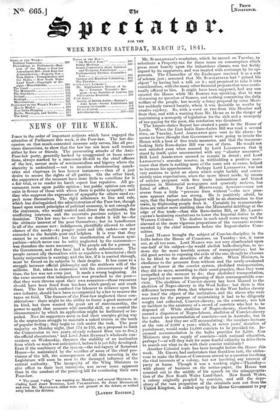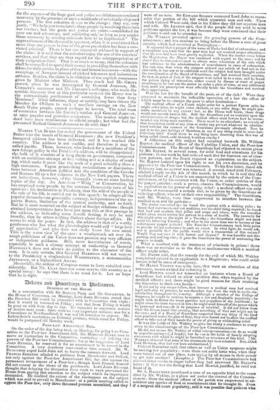NEWS OF THE WEEK.
FIRST in the order of important subjects which have engaged the attention of Parliament this week, is the Poor-law. The last dis- cussion on that much-contested measure only serves, like all pre- vious discussions, to show that the law has not been well treated either by foes or friends. The persevering attacks of the Anti- Poor-law party, generally backed by exaggerated or loose asser- tions, always marked by a rancorous to the chief officers of the law, savour more of sentimentalism and bigotry where the sincerity is undoubted — not to mention electioneering quack- eries and elaptraps in less honest instances—than of a just desire to secure the rights of all parties. On the other hand, the supporters of the measure have done little to conciliate for it a fair trial, or to render its harsh aspect less repulsive. All go- vernment rests upon public opinion : but public opinion can only exist in favour of those with whom there is public sympathy ; and they who suppress the expression of sympathy for others need ex- pect none themselves. The rigid adherence to line and rule, which has distinguished the administration of the Poor-law, though based upon sound principles of political economy, is not enough for the statesman, who would control and direct the multitudes, the conflicting interests, and the uncertain passions subject to his dominion. This law may be—we have no doubt it will be—for the ultimate interest of the poor themselves ; but its ,beneficence is all of the sterner sort : indulgences, plentifully allowed to other classes of the needy—to pauper peers and idle cadets—are not extended to the humble poor and helpless. It is true that they cannot be so extended ; but the manifestation of human sym- pathies—which never can be safely neglected by the statesman— was therefore the more necessary. The people ask for a parent in the Government, and they have had a harsh schoolmaster. The people cannot ally themselves with so repulsive a benefactor ; their hearty cooperation is wanting; and the law, if it is carried through, must be forced on its subjects in their despite. It has come to a struggle between official philosophy and the stubborn will of the millions. But, taken in connexion with the circumstances of the time, the law was not even just. It made a wrong beginning. At the same moment that independence was preached to the poor— that they were thrown upon their own resources—those resources should have been freed from burdens which paralyze and crush them. The law which confined the labourer to reliance upon his own industry, should have been accompanied by a law to remove the taxes on food. The framers of the Poor-law neglected these con- siderations: there might be the ability to frame a good measure of its kind, but there wanted the great art of statesmanship, the power to apply that measure with merciful skill, or to control the circumstances by which its application might be facilitated or im- peded. Now its supporters seem to feel their energies giving way in the ungracious struggle to maintain a naked truism in the teeth of popular feeling ; they begin to sink under the task. The poor majority on Monday night, (but 174 to 135, on a proposal to limit the Commission to two years, already reduced from ten to five,) the official absenteeism,* and Lord JOHN RUSSELL'S wholesale con- cessions on Wednesday, threaten the stability of an institution from which so much was anticipated, before it is yet fully developed. Even if the machinery of the system—the red-tapery of Somerset House—be maintained by the sacrifice of some of the chief pro- visions of the bill, the consequences of all this wavering in the Legislature will soon be seen in the damaged influence of the central authority. The incapacity of the Whig Ministers to give effect to their best intentions, was never more apparent than in the conduct of the pending bill for continuing their own Poor-law.
• The usual "whip" was wanting on Monday; and several Ministers, in. eluding Lord JOHN RUSSELL, Lord PALMERSTON, Sir JOHN Honuousic and even Mr. MACAULAY, either were not present at the debate, or walked away before the division. Mr. SCHOLEFIELD'S resolution, which he moved on Tuesday, to substitute a Property-tax for those taxes on consumption which press most heavily upon the industrious classes, was but feebly
argued by its supporters, and was treated with contempt by its op-
ponents. The Chancellor of the Exchequer received it as a sort of solemn jest ; assumed that Mr. SCHOLEFIELD had " gained his
object" by having had a talk on it ; and promised to take it into consideration, with the many other financial projects that were conti- nually offered to him. It might have been supposed, had any one
entered the House while Mr. BARING was speaking, that he was
discussing no question of finance, and nothing concerning the daily welfare of the people, but merely a fancy proposal by some Mem- ber suddenly turned lunatic, whom it was desirable to soothe by evasive cajolery. So, with a word or two from this Member and from that, and with a warning from Mr. liumE as to the danger of maintaining a monopoly of legislation for the rich and a monopoly of tax-paying for the poor, the resolution was dismissed. The Import-duties Report has created a panic in the House of Lords. When the East India Rum-duties Bill was read a second
time, on Tuesday, Lord ASHBURTON gave vent to his alarm : he
seems to have thought that Government were going to invade the House with a host of free trade measures, and that the innocent- looking little Rum-duties Bill was one of them. He would not
rest satisfied even when assured by Lord LANSDOWNE that it stood by itself, quite unconnected with any "ulterior measures." Still Lord ASHBURTON seemed to remain in dread ; and Lord
LaxsnowNE's oracular reserve, in withholding a positive assu- rance that there is nothing more of the same sort to come, helped
to increase his apprehension. Perhaps Lord LANSDOWNE was not
very anxious to quiet an alarm which might luckily and conve- niently raise expectations, when the more direct mode, by means of articles pregnant with free trade insinuations and hinted
promises in Ministerial newspapers and quarterly reviews, has failed of effect. For Lord MONTEAGLE, however—once not
averse from a little "pressure from without "—the new pres-
sure appears rather too strong. He is positively afraid, he says, that the Import-duties Report will be an obstruction to free trade, by frightening people from it. Certainly its recommenda- tions are rather more startling than the Ministerial dabblings at the edge of free trade—than this Rum-duties Bill, or Mr. LABOU:. cusses hesitating resolutions to lower the Imperial duties in the Western Colonies. The dealers in such small wares may well be alarmed at the more vigorous proportions of the measures recom- mended by the chief witnesses before the Import-duties Com- mittee.
Lord MAHON brought the subject of Convict-discipline in the hulks before the House of Commons, on Tuesday : not, it turns
out, at all too soon. Lord ManoN was not very clearheaded upon one-half of his subject—he would abolish hulk-discipline, to re- store the far more horrible system of transportation ; but he did good service in exposing the evils of the one, though he chooses to be blind to the atrocities of the other. When Ministers, in obedience to the pressure from without and the newly-awakened sense of horror at the convict system, abolished transportation, they did no more, according to their usual practice, than they were compelled at the moment to do : they abolished transportation, but provided no means for disposing of their untransportable con- victs. The abolition of Convict-slavery has been likened to the abolition of Negro-slavery in the West Indies : but there is this difference between them, that whereas in the 'West Indies slavery was itself the object of the institution, and the slaves who were necessary for the purpose of maintaining it had to be diligently sought and collected, Convict-slavery, on the contrary, was but an incident to the existence of a crowd of convicts who had to be disposed of. While abolition of Negro-slavery, therefore, has caused a dispersion of Negro-labour, abolition of Convict-slavery has caused an accumulation of convicts—not in Australia, but in the hulks. And they are still accumulating : the numbers increase at the rate of 2,000 a year ; which, at seven ears' duration of punishment, would make 14,000 convicts to be provided for. In- creased accommodation in the hulks provides for 3,500. Can Ministers stop the supply of convicts—with national education, perhaps ?—or will they wait for some fearful calamity to drive them to search out what to do with their convict multitude ?
Another Colonial topic has been brought before the House this week. Mr. GROTE had undertaken that thankless task, the endea-
vour to make the House of Commons attend to a question involving
the vital interests of a colony, but not involving any interest of party at home. Though it was a working night—Thursday- with plenty of business on the notice-paper, the House was counted out in the middle of his speech on the misappropria- tion of the New South Wales Land-fund. New South Wales, a colony originally peopled by convicts, and still the depo- sitory of the vast proportion of the criminals sent out from the, United Kingdom, is called upon by the Home Govepment to pay for the expense of the huge gaol and police establishments rendered necessary by the presence of such a multitude of criminally-disposed persons. The free colonists demur to the charge : they say, very Justly, "We help you to maintain these people by receiving them into our service ; but the gaols and police are yours—established for your use and advantage, and subsisting only so long as you render them necessary by sending criminals here to be imprisoned." The oppressiveness of the demand is apparent, when it is considered that more than one person in four of the gross population has been a con- victed criminal. There is but one argument adduced in support of the claim': it is said that the colonists enjoy the use of the convicts' services, and that they are thus repaid for the misappropriation of their emigration-fund. That is as much as to say, that the colonists shall be compelled to spend their money in providing themselves with felons for their service in place of free and honest labourers—with the sweepings of Newgate instead of picked labourers and industrious artisans. Besides, the claim is in violation of the explicit assurances given by Minister after Minister. Thus much had Mr. GROTE proved, when he was interrupted 1:7 General JOHNSON, Mr. CORBETT'S successor and Mr. FIELDEN s colleague, who made the notable discovery that at this particular moment the House was in the extraordinary predicament of containing fewer than forty Members! What influence, skyey or earthly, may have driven the Member for Oldham to such a needless outrage on the New South Wales people, cannot perhaps be known. The total want of connexion between Mr. GF.OTE'S motion and General Joints" at once puzzles and provokes conjecture. The motion might in- deed have been troublesome to official people ; but what had the presumed Radical General JOHNSON to do with that ?



























